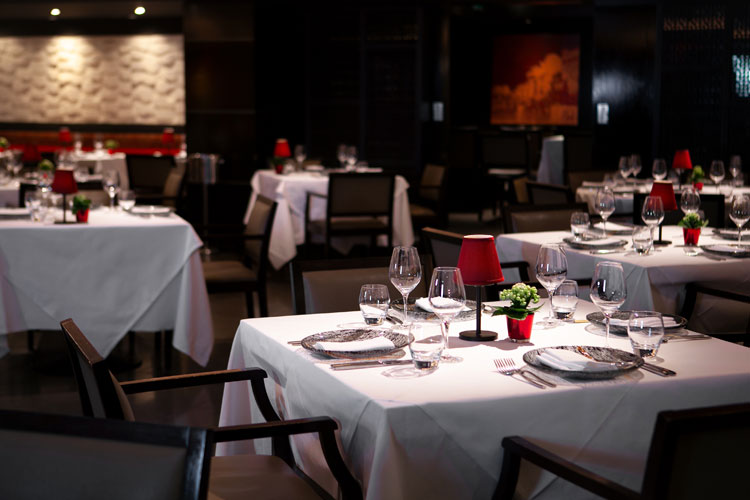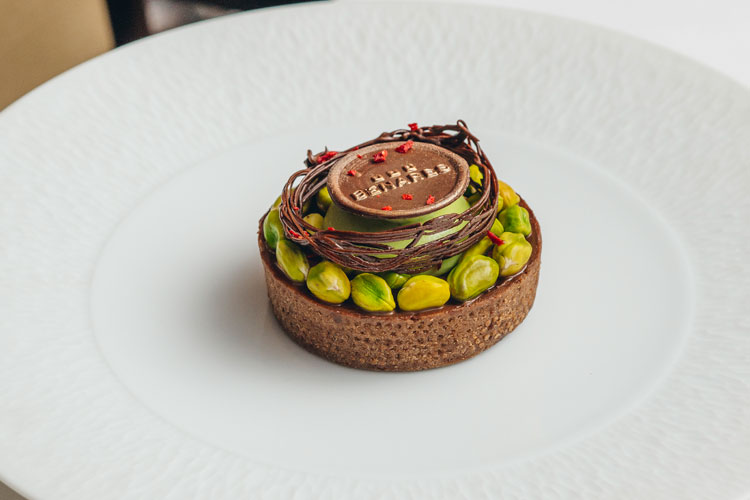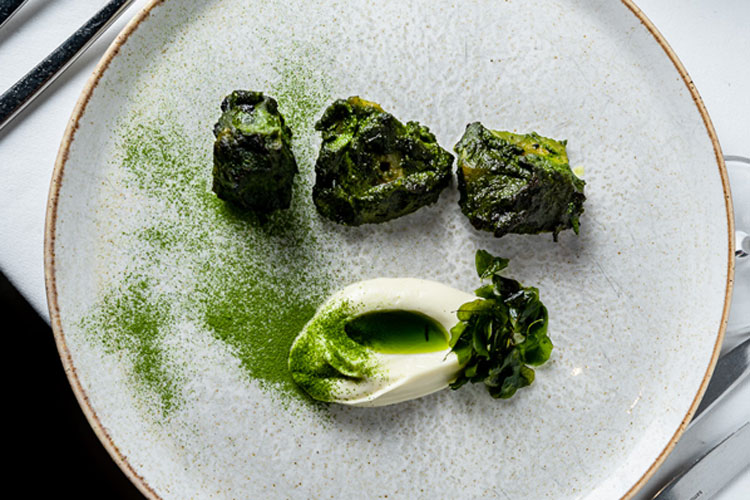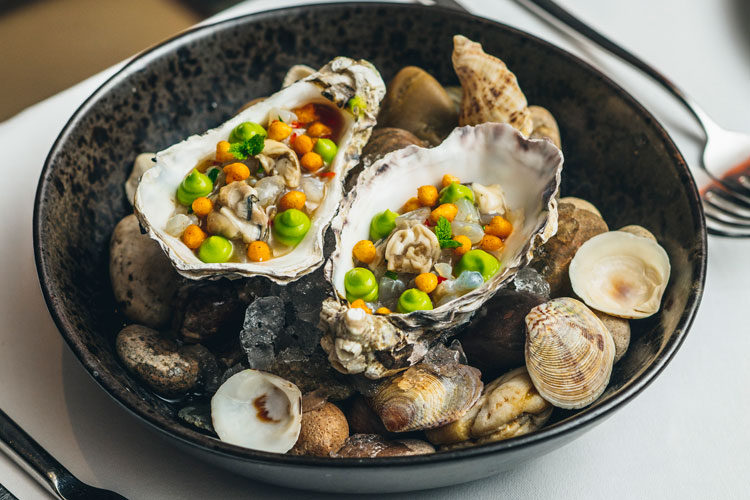How a chef from Delhi is using his classic French training to make waves in Indian fine dining
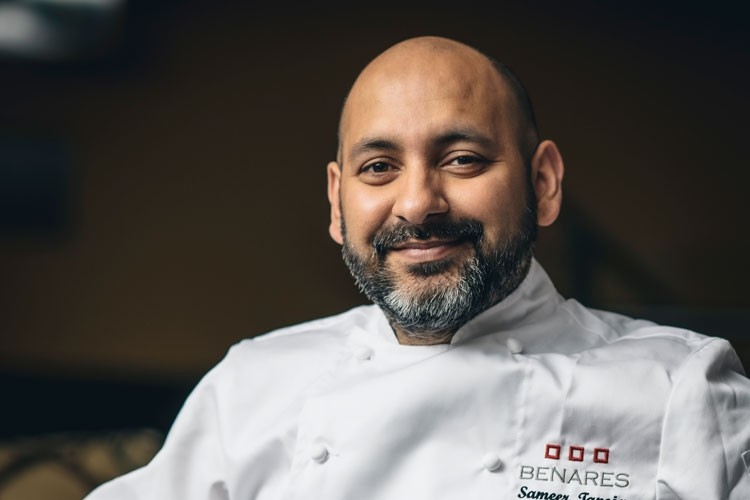
There is a dish of squid keema that has recently returned to the menu at Benares after having a culinary sabbatical. Inspired by chef Pierre Koffmann’s squid bolognese, a popular starter when he ran Koffmann’s at the Berkeley, the dish of masala squid served with cumin vermicelli is Benares’ executive chef Sameer Taneja’s homage to his mentor and underwent numerous iterations before the famous French chef was happy with the dish created in his honour. In fact, it took no less than seven months to reach a revised recipe that passed muster with Koffmann, Taneja admits somewhat sheepishly, such is the culinary shadow he still casts.
It might come as a surprise that a chef, even one so celebrated as Koffmann, wields such influence over the food in another chef’s restaurant, particularly one serving Indian cuisine, but it runs deeper than that. The French chef casts his gastronomic gaze over every single dish that makes it onto the Mayfair restaurant’s menu, and his blessing is crucial. “It’s just a discipline,” says Taneja of this relationship. “When he comes and tries my food he’s not biased – he even tells me off in front of lots of people if it’s not right, but I always take it positively. He’s honest and it keeps us on our toes.”
How this relationship came about can only be understood when one looks back at Taneja’s career and sees the impact that classic French cuisine, and Koffmann’s advice and tutelage, has had on it. Born in India, Taneja was educated first in a small village in neighbouring Nepal and later in Delhi before enrolling in a hotel management course at Mangalore University in the south western state of Karnatake. Describing himself as an under-performing and unmotivated student, hotel management was found to be only option left for him, and the practical cooking aspect of it the easiest part. “I always wanted to eat tasty food,” he recalls. “My mum was not a very good cook, so I always craved good food.”
“I was not intelligent enough to understand
the Indian culture and my own roots,
so I chose to cook European food"
For many chefs, this would have kickstarted a career in exploring and perfecting the food of the vast sub-continent, but for Taneja this was not the case. By his own admission as a young chef he was uninspired by the cuisine of his homeland - something he now acknowledges was a mistake - instead looking towards what he considered the more refined and interesting food of Europe for his inspiration.
“I was not intelligent enough to understand the Indian culture and my own roots, so I chose to cook European food as it had a better status,” he says. “I thought that if I had to go on a date, would I take my girlfriend to eat panipuri or a dosa or would I choose somewhere European? Indian food was not polished enough in my brain.”
From his training he secured a job as a commis chef in the kitchen of The Oberoi Rajvilas in Jaipur where he stayed for nearly three years but, rather than making him fall in love with Indian cooking, working alongside European chefs only further piqued his desire to cook in a more western style. “We had a French chef and an English chef at that hotel who always talked about Michelin stars,” he says. “I promised myself I would not die until I got my third star. I was only a commis; I had no scope, no plan, only a vision that I wanted to cook and get three stars.”
Taneja’s interest in European cuisine deepened with the reading of Marco’s White Heat, eventually spurring him to write to the world’s top French chefs asking for a job as a porter to get a foot on the first rung of the classical cooking ladder. “I wrote to Pierre Gagnaire, Michel Roux, you name them. I sometimes didn’t know where the letter was going, it was just the chef I wanted to contact.”
He initially thought he’d made a breakthrough when Alexis Gauthier responded but an issue over his work permit put him back to square one. And then, after a whole year of penning letters, Pascal Proyart from Knightsbridge restaurant One-O-One answered his call. “He gave me a chance. He said to me, ‘I’m not a starred restaurant but I promise you the food is not less than a Michelin star and you will learn from me’. He taught me that it’s not about getting a star. A star was the parameter for good cooking I’d built into my brain, but there’s more to cooking than that. My journey started there.”
A classical training
Taneja would stay with Proyart for nearly six years, during which time his love for French cuisine and its techniques blossomed. It was a life-changing experience, he says. “On the first day I landed in England the way I thought about food changed.”
On leaving One-O-One in August 2009, Taneja joined the Roux family at The Waterside Inn at Bray as chef saucier before moving to work with another French great Joel Antunes at his Brasserie Joel at Park Plaza Westminster Bridge. However, it was his time working alongside Koffmann as sous chef at his The Berkeley Hotel restaurant that proved the most formative, and which set him on the culinary trajectory that he follows today.
“After working with Pierre for seven months he called me into his office and said, ‘I’m not going to complete your probation’,” Taneja recalls. “I was shocked. But he said that he knew how hard I worked cooking French food and that if I cooked with spices, I would reach my dream. I went to my locker and cried because I believed he didn’t think I was good enough.”
"Atul had a such a big influence on the restaurant
that people still thought he was in
the kitchen even after he’d gone"
Far from thinking this, Koffmann believed that Taneja’s classic training could be combined with his Indian heritage to great effect, suggesting he go and work with Atul Kochhar at Benares. Despite having only a small amount of experience in the kitchen of an Indian restaurant right at the start of his career, in 2012 he took on the role of head chef because no other positions were available.
Kochhar’s cooking style at Benares turned out to suit him in the early days, with Taneja describing it as serving Indian food with a European twist. “It was maybe a bit too European, it was not that spiced. We were serving smoked salmon with cumin, at Koffmann we also had a smoked salmon with cumin dish. I’m not sure the guests felt it was very Indian.”
Half plates, full drinks
Taneja would work at Benares for three-and-a-half years with Kochhar giving him free rein to put his individual stamp on the menu. It was a period where he learnt a lot about cooking Indian food and grew in confidence and which later encouraged him to return to his homeland and immerse himself in the food culture he had dismissed over a decade ago. Inspired by his newfound love of Indian food, he took up an offer to lead the kitchen at new Indian restaurant Talli Joe in central London, a more casual concept.
Taking ‘talli’, a Hindi word meaning ‘tipsy and happy’, the restaurant specialised in small plates - or half plates, full drinks, as Taneja describes it. With its bright decor and casual feel, at the time it was unlike the majority of Indian restaurants in the capital in terms of style but it was here that Taneja’s more progressive style of cooking, and the impact his time in French kitchens had on it, really started to shine through. Dishes included a crab meat devilled scotch quail’s egg; wild mushrooms were served with rice; shrimp poached in a spicy South Indian tomato broth with curry leaves, garlic and coriander leaves; and ‘chicken 21’, so named because the recipe went through 21 versions before it was perfected. It was at Talli Joe that Taneja started introducing more heat in his dishes for punchy, more impactful dishes than served at Benares.
Taneja’s time at Talli Joe lasted for just over two years before personal reasons forced him to leave (the restaurant closed a year later). “I still have my heart and soul in it,” he says. “If an opportunity came up, I’d love to do this kind of concept again.”
Instead, he returned to Benares as executive chef, although this time under slightly different circumstances. During his time away the restaurant had undergone significant changes, with Kochhar leaving under a cloud in 2018 having made anti-Islamic statements on Twitter. The restaurant also found itself bereft of a Michelin star for the first time in 17 years. Taneja was regarded as the man who could win it back - and eventually did exactly that two years into his second tenure in 2021.
Did he ever have any doubts about returning to the restaurant rather than starting at somewhere new? While some chefs have been known to return to their old stomping grounds it’s still a rarity in a sector where progression and moving onto new projects is par for the course.
“It was a fresh start for me,” he replies. “We were told we had to start again. Atul had a such a big influence on the restaurant that people still thought he was in the kitchen even after he’d gone and to change that perception was a big challenge. I knew the kitchen, but I wanted the guest experience to be completely different.”
Making Benares his own
To this end Taneja has succeeded. A meal at Benares is in parts surprising, invigorating and always exceptional. Dishes on the current menu include autumn truffle shorba, a delicate creamy and frothy dish that wouldn’t be out of place in a French restaurant; baked Malabar scallops served with crispy bread podi; tandoori muntjac deer; a duck liver nihari; and macchi ceviche chaat, a dish of cured sea bream, Carlingford oyster, aam-panna tiger milk, and avocado purée that doesn’t immediately feel very Indian, but which also somehow doesn’t feel incongruous.
On another visit to Benares, Taneja presented a fish biryani served en croute in a fish shaped pastry much to the surprise of the dining room. Some dishes are mild and delicately spiced while others have a whack of heat unusual in fine dining Indian restaurants. It is assured, confident cooking of the highest order, all the more impressive when you consider that, when full, the restaurant can do 160 covers at any one time.
“If I don’t bring something new
or brave to the menu in every few weeks,
I have one resignation"
“We have a very disciplined kitchen, what we want to achieve is something exceptional,” he says. “When my diners come, especially non-Indian diners, they choose to eat here to get some heat,” adding that the restaurant has increased the spiciness of some of its dishes in recent times. “Every day we used to have to give 15 to 20 spicy sauces on the side [when people asked for more heat], now I get a request for one about every six months. No one is asking for more heat.”
Taneja insists that despite his French training, the food at Benares is not influenced by European techniques. “I’m not bringing European techniques to Indian food, it’s just evolution. I use soy sauce in my kitchen, which is not very Indian – my cooking is ingredient-based. But I like spices and will always cook with them.”
Moreover, the progressive nature of his cooking is driven not just by him but by his team, members of which he fears will leave if they are not continually stretched.
“If I don’t bring something new or brave to the menu in every few weeks, I have one resignation. This is very unlikely in any other kitchen. Once they are comfortable, they want to leave – I’ve never seen this in any other kitchen.”
A fishy future?
Under Taneja Benares is back firing on all cylinders, with repeat custom having soared from around 3% two years ago to 30-40% today, he says. “This is good as it gives us a sense of confidence that we must be doing something right, but also bad because we have to work harder to keep people interested.”
He’s had to contend with loyal customers expecting certain dishes every time they come, even if it goes against seasonality, recalling the time a group cancelled their booking when they discovered the chestnut shorba was off the menu. “I feel ashamed of using ingredients out of season, but I want my guests to be happy, so I tell the owners that if there’s a complaint that I’m using a winter ingredient in summer than it’s their fault. That is also why the ceviche dish is served even in the winter.”
At the mention of Benares’ owners Taneja’s mind turns to the future and new projects. He says they are looking to expand in the UK and that he wants to open a smaller venue with their backing. Plans are afoot for an Indian fish restaurant, due to be called Fin, that will serve dishes inspired by Indian fish cookery but also his experience cooking fish in French restaurants. The restaurant nearly became a reality a few years back, but an investor pulled out at the eleventh hour.
“I’m from Delhi, which is very far away from the sea. I was uneducated about seafood until I worked with Pascal,” he says. “Unless you’re on the coast, fish and shellfish in India is always frozen. And that’s nearly always the case in terms of Indian food in the UK, too. But fish has become an obsession for me.”
Beyond that, Taneja says he also wants to open a restaurant that has a fully farm-to-fork approach. “I want to open a small restaurant with full control. That doesn’t mean I don’t have full control at Benares, but I still have a dream to cook 100% from farm to fork. I want to appoint a head gardener and have my own farm. There are a number of chefs who take this approach and I really want to be one of those, where I pick my own carrots and put them on the plate. I’d love to be able to create a menu based on what we can get our hands on.”
And what of his dreams of achieving three Michelin stars when he was just a young commis in Jaipur? Has his career since then dampened this desire? As you might expect from a chef whose mentor has held three himself, the answer is no.
“If I say I’m not pushing for the second star and more I’m lying. Every chef is pushing for them, even if they say they are not. If I was in the Olympics, I would want to win a gold medal and it’s no difference here. I want to be recognised.”
